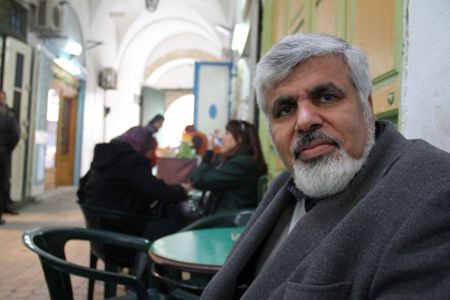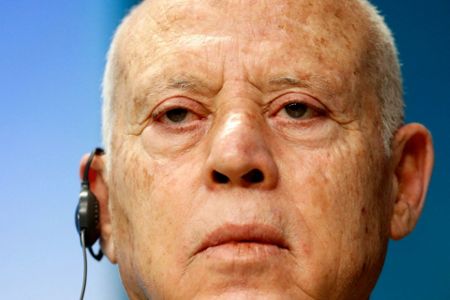TUNIS, Tunisia (AP) — Family members of jailed lawyers and politicians in Tunisia want the International Criminal Court to investigate claims of political persecution and human rights violations as an increasing number of President Kais Saied's opponents are arrested and several in prison stage hunger strikes.
Yusra Ghannouchi, the daughter of jailed opposition leader Rached Ghannouchi, plans to join other jailed dissidents' sons and daughters in The Hague on Thursday to announce plans to pursue action at the court.
Members of the same group made a similar case to the African Court on Human and Peoples’ Rights earlier this year. In a news release on Monday, they noted the increasing number of judges, politicians, journalists and prominent opposition voices being arrested and alleged a campaign of persecution against Black migrants throughout Tunisia.
“There has been a major increase in repression and mass human rights violations by Tunisian authorities at the behest of President Kais Saied,” the news release read.
The announcement will likely draw attention to the increasingly repressive political landscape that has taken shape in Tunisia since the country revised its constitution in 2021, allowing Saied to expand his powers, freeze out the parliament and rule largely by decree. As the country's economy sinks, Saied's government has jailed dozens of critics and drummed up animosity against Black migrants. It has often escalated to violence.
In addition to Ghannouchi, the group includes: Kaouther Ferjani, daughter of Ghannouchi's Ennahda colleague Said Ferjani; Jaza Cherif, son of scholar-activist Chaima Issa; and Elyes Chaouachi, son of lawyer and former lawmaker Ghazi Chaouachi. Each parent is a vocal critic of Saied who is or has been imprisoned. More than 20 Saied opponents have languished in prison since February on charges that include endangering state security.
The group is expected to file what's called an Article 15 submission on Thursday, providing the court's prosecutor documents that outline claims of at least one of the four crimes it pursues — genocide, crimes against humanity, war crimes or crimes of aggression.
Anyone can file such a claim with the court for review. Though they're a significant channel for the International Criminal Court, few progress to extensive investigations.
“They provide a unique channel for actors, including NGOs and victims’ associations, to bring the prosecutor’s attention to alleged crimes,” said Maria Elena Vignoli, Human Rights Watch's senior international justice counsel.
The group's arrival at the court comes amid hunger strikes, and days after former lawmaker Abir Moussi, another prominent Saied opponent, was detained while trying to file a complaint at Carthage Palace, the Tunisian president's headquarters. On Tuesday, her lawyer told TAP, Tunisia's official news agency, that he did not know why she was being detained for 48 hours.
In recent weeks, jailed politicians in Tunisia have staged hunger strikes to protest what five strikers' defense team called “a judicial sham" that led to their imprisonment.
Attorneys for Chaouachi, as well as striking politicians Issam Chebbi, Abdelhamid Jelassi, Ridha Belhaj and Khayam Turki, said in a news release this week that the accusations and legal process “deprives prisoners of their freedom without presenting any justification for the accusations made against them.”
Their strike came after Ghannouchi observed a three-day hunger strike over the weekend in solidarity with Jawhar Ben Mbarek, the leader of the leading coalition opposed to Saied's regime who is on an open-ended hunger strike.
___
Metz reported from Rabat, Morocco.
Copyright 2023 The Associated Press. All rights reserved. This material may not be published, broadcast, rewritten or redistributed without permission.






